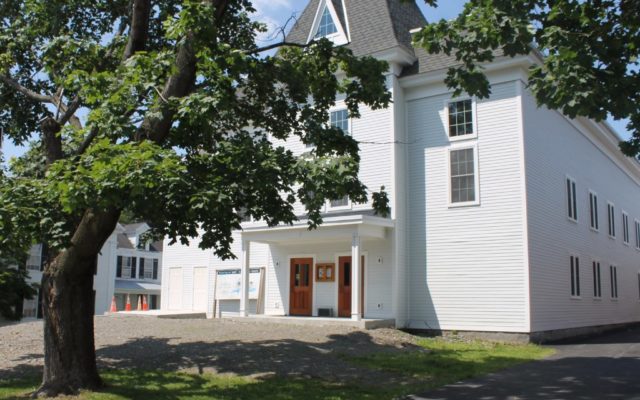
Partners sought for program enhancing dementia care
DOVER-FOXCROFT – The Commons at Central Hall has been selected as one of three sites in Maine to oversee a new program aimed at improving the quality of care for older adults diagnosed with dementia. The Northern New England Network, the Tri-State Learning Collaborative on Aging and national healthcare consulting company, Qualidigm, brought together key leaders within nine communities (three per state) across northern New England to work together to identify and share successful approaches, models and supports that can improve the health, care and care coordination of community-dwelling older adults diagnosed with dementia, as well as their care partners.
Enhancing the Care and Health of Older Adults Living with Dementia will use proven Project ECHO (Extension for Community Healthcare Outcomes) methods. Project ECHO is an evidence-based method developed by researchers at the University of New Mexico which links teams of interdisciplinary experts with teams of participants via virtual learning sessions. The web-enabled, case-based sessions allow experts and participants to share best practices. Presenters mentor and share their experience, enabling community teams to build capacity and expertise to address systems issues within communities and to improve the quality of care, organizers said.
A competitive process was used to identify and select Community Conveners, the organizations responsible for coordinating the program.
“The Commons is a Community Convener,” explained Tara Smith, The Commons development director. “This is the only Project ECHO program specializing in dementia care in Maine.”
The Convener serves as a connector and catalyst for change, said organizers. While the Convener is the hub of the program, community partners are the “spokes.” Locally, those spokes include Pine Tree Hospice, Mayo Regional Hospital and its Emergency Medical Services department, the Dover-Foxcroft Police Department and Hibbard’s Skilled Nursing and Rehabilitation Center.
“Our monthly Project ECHO meetings are open to any individual or organization who interacts with people affected by dementia, in the hopes of increasing knowledge of successful practices and resource sharing around dementia care,” Smith said.
While the program aims to help people not yet residing in assisted living facilities, nursing homes are also good partners, “because they deal with dementia regularly and are active participants in our community care. We would like such educational opportunities to be available to assisted living facilities staff,” Smith said. Partners might also include organizations not directly involved in dementia care, but that come into contact with dementia patients and their caregivers.
“Hopefully, there will be healthcare professionals that we are engaging, but there are other entities like police departments, banks and even the library, that can identify community members affected by dementia and enhance our regional support network,” Smith said. “The idea is to build communication amongst people that interface with dementia. If there are people in our communities that are interested in learning about this syndrome, we invite them to participate. Ideally, we can all share knowledge, identify gaps and boost support services for people affected by dementia.”
The grant-funded program will run for one year, with monthly learning sessions at The Commons that began in September and will end next June. “Partners can come in at any point during the 12 months,” she said. “Each session is its own unique gathering of knowledge and information that is independent of prior sessions.”
During each session, various experts present a case study of dementia care in their communities, followed by opportunities for other conveners and participants around the New England region to ask questions and share insights. “There is also an opportunity for faculty to respond, and a secretary takes notes so there is a written summary of each session available to all participants,” Smith added.
The four overall goals of the program include:
increasing positive health outcomes for older adults while decreasing risks that impact their quality of life;
gain knowledge through the spread of best practices;
increase capacity and confidence to support older adults living with dementia and their care givers living well;
provide an understanding between the health care system and the community partners to help bridge their services and build a network of support that provides better coordinated care for older adults with dementia;
and provide knowledge on technological solutions that can help to promote safety for older adults living with dementia.
Public health or community coalition leaders, first responders, area agencies on aging, disability resource centers, associations dealing with dementia, municipal officials, legal service providers and caregivers are also encouraged to attend.
The next session is at 11:30 a.m. on Thursday, Dec. 12 at The Commons. Call 343-3018 or email tarasmith@centralhallcommons.org for more information. For more information about Project ECHO, visit https://echo.unm.edu/.